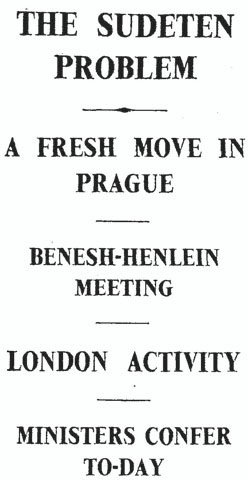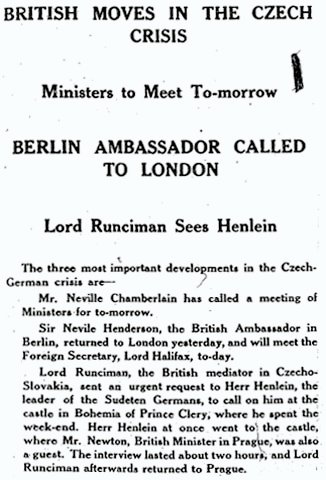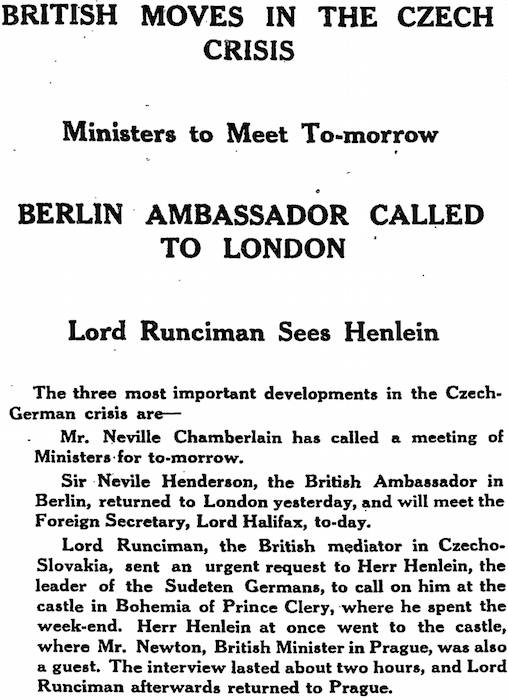
Not a lot of news today -- at least, not a lot of new news. As the above headlines from The Times, p. 10, show, the meetings which were announced on Monday and which took place on Tuesday have, er, taken place, but no public statements have been made about what transpired in them, other than that everyone concerned is agreed that Britain's policy should be remain unchanged. There's support too, from the Prime Minister of Australia, Joseph Lyons. The Canadian Minister of National Defence, Ian Mackenzie rather embarrassingly gushes that the British 'are sleepless sentinels on the frontiers of freedom [...] There is nothing more magnificent in history'.
The Sudeten crisis isn't the only thing going on in the world, of course, but it's very big. As the eye runs across the top of this page, five out of seven of the major headlines (other than than the ones shown above) relate to the crisis in some way:
NAZI CRITICISM OF BRITAIN
WRONG TACTICS FOR PEACE
CZECH CONCESSIONS DENIED
'Official circles' (meaning Nazis? Diplomats? Both?) are still smarting over Sir John Simon's weekend speech, and the suggestions in the British press that violent incidents between Sudetens and Czechs are being exaggerated are resented. The British government would do well to let the Czechs know that it will not support them unconditionally; the latter seem to have the idea that all they need to do is put off the Sudetens with promises until Britain has finished its rearmament programme and then they will be able to ignore them.
TURNING POINT IN PRAGUE
THE NEW PLAN
DR. BENESH MEETS THE SUDETENS
Yet more meetings without any real news. Dr. Milan Hodza, the Prime Minister of Czechoslovakia (where everyone seems to be a doctor!), will make 'a full statement on the nationalities problem' tomorrow.
CLOSING IN ON HANKOW
JAPANESE MOVE FORWARD
HEAVY AIR RAID
Hankow looks to be in trouble. The airminded reader will have noticed the reference to an air raid:
According to Chinese reports 1,000 people were killed or wounded when 50 Japanese aeroplanes dropped 200 bombs on the small town of Kingshan, 80 miles north-west of Hankow, starting many fires, which are still raging.
Bombing is all the rage at the moment. A couple of small articles on the previous page (p. 9) reported that Republican-held Alicante and Valencia were bombed yesterday, as was Nationalist-held Ceuta, though there were only a handful of casualties between them. The Manchester Guardian notes (p. 8) that publication of a report into an earlier bombing of Alicante and Barcelona is imminent while a photo on the back page (p. 16) of the Daily Mail shows a group of Chinese girls and a Salvation Army worker undertaking rescue work in the ruins of a bombed-out building in Canton.
STOCK MARKETS RECOVERY
U.S. DOLLAR ABOVE OLD PARITY
The stock markets referred to here are the City's, i.e. London. The reason for the recovery is the relatively hopeful news about the international situation (not sure what that news was, but I suppose that jaw-jaw is better than war-war), though it came too late to prevent sterling from taking a beating.
SOVIET NAVAL PURGE
SHOT ADMIRALS
EVERY FLEET LOSES ITS COMMANDER
This happened a few months ago, but it has taken a while for the Naval Ministry to admit that they'd carelessly lost all of their high-ranking officers in a purge. The reason given is that the 'traitors and wreckers' had advocated a purely defensive navy, when it is self-evident that the Red Fleet should have an offensive capability.
The crisis is the subject of leading articles in The Times, the Daily Mail and the Manchester Guardian today. The first two say that the Czech government must make concessions to the Sudeten minority. The Guardian concentrates on Germany (p. 8):
there are two things we would like to have both the German Government and the German people know: that in the opinion of this country there is no shadow of a reason why peaceful negotiations should be abandoned for force and that the use of force would in all probability not be "local" (Spain and the Far East are no analogy) but would almost certainly lead to the unspeakable calamity of a wider war from which we should find ourselves unable to stand aloof.
Hopefully somebody in Berlin is paying attention.
![]() This work is licensed under a Creative Commons Attribution-NonCommercial-NoDerivatives 4.0 International License.
Permissions beyond the scope of this license may be available at http://airminded.org/copyright/.
This work is licensed under a Creative Commons Attribution-NonCommercial-NoDerivatives 4.0 International License.
Permissions beyond the scope of this license may be available at http://airminded.org/copyright/.





Pingback:
Airminded · Thursday, 1 September 1938
Pingback:
Airminded · Friday, 2 September 1938